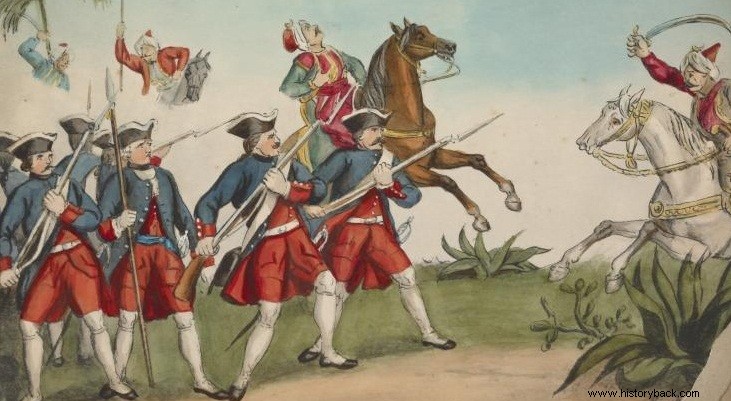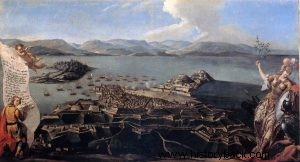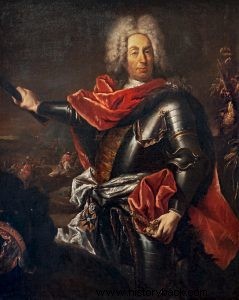
After their victory against the Venetians in the Peloponnese in 1715-16 (7th Venetian-Turkish War), the Turks decided to attack Corfu. The Turks appeared opposite the island with 116 ships which carried 7,000 janissaries, an equal number of Albanians, 1,500 spachids, about 500 gunners, 1,000 more auxiliaries and several thousand men of the ships' passengers. Some put the number of Turks at 50,000 men.
On the other hand, the head of the Venetian forces Marshal von Schulenburg had only 3,097 regular soldiers. Of course, the Greek residents also helped catalyze the defense.
Siege
On July 8, 1716, 4,000 janissaries landed in Corfu. However, the daring attack of a Venetian squadron of 27 ships terrorized the Turks and stopped, temporarily, the transfer of forces to the island. On July 10 the Turks returned and continued to transport forces. In the meantime, the defenders were reinforced with 1,500 men, food and supplies by sea, while allied ships (of the Knights of Malta, Spanish, Genoese, Tuscan, papal) began to arrive, which covered the city's fortress from the sea.
At the same time, the Turks began operations by occupying a fortress and a hill that covered the approaches to the city of Corfu. On August 5 they demanded that Schulenburg surrender the city, threatening to slaughter him and his men if they took the city by storm. Of course the German marshal rejected the Turkish ultimatum.
Thus the Turkish leaders Mehmet Pasha and Kara Mustafa Pasha began a heavy bombardment of the city. An attempt by the Christian fleet to intervene failed due to the wind. Sullenburg asked the Venetian admiral Pisani to support an exodus he planned but the admiral refused. Thus the Turks surrounded the city undisturbed.
On August 8, however, another infantry regiment was transferred to reinforce the defenders. The new arrivals even informed the besieged of the great Austrian victory against the Turks at Petrovaradin, which boosted morale. On the night of August 18, the defenders made an exit but were repulsed. In fact, the Turks, spearheaded by the janissaries, counterattacked and reached the bastion of Ag. Athanasios, raising their flags on the wall.
However, Schulenburg had not said his last word. Drawing his sword, he led his men and charged against the enemy, slaughtering the Turks without mercy. In this conflict on the bastion and the gate of Scarponas, the Greek militiamen distinguished themselves, as well as a detachment of Jewish residents of the city led by the son of the local rabbi, equipped at the expense of the local community.
On August 20, as the Turks were trying to regroup, a severe storm broke out. The Turkish trenches were flooded, the gunpowder became wet and useless, and their fleet was damaged. After that the Turks decided to lift the siege and withdraw. In fact, they did it with such violence that they left behind plenty of war material (56 guns, 8 mortars), but all their sluggish men. The Turkish disorganization was Admiral Pisani's great opportunity to completely destroy the Turkish fleet but, unfortunately, he did not take advantage of it.
The reason for the abrupt Turkish withdrawal is still the subject of debate. Some claim that they were frightened by the arrival of a Spanish squadron. However, this squadron only had six ships, so it is unlikely that they were frightened by them. Others argue that the Turks were horrified when they learned of the Petrovaradin crash.
However, this version also does not stand as this battle took place on August 5 and the Turks left Corfu on August 22 (11 according to the old calendar). The Turks lost a total of over 15,000 men, against small losses of the garrison, but heavy losses of the civilian Greeks on whom the "brave" Turks were breaking out. The residents, as well as the marshal and his men, attributed the sudden withdrawal of the Turks to a miracle of the patron saint of Corfu, Saint Spyridon, and since then, on August 11, a litany is held in the city.
Marshal von Schulenburg
Marshal Johann Matthias Count von Schulenburg was born in 1661 in Emden, Saxony. In 1687 he enlisted as a volunteer in the Austrian-imperial army and fought against the Turks in Hungary reaching the rank of captain. By 1693 he had been promoted to colonel.
He fought against the French in the War of the Grand Alliance and in the War of the Spanish Succession, having been promoted to lieutenant general. In 1702 he entered the service of Saxony and fought against the Swedes in the Great Northern War . In 1707 he returned to the imperial service and again fought against the French in the great battles of Oudenard and Malplaquet, being promoted to marshal.
With the end of the War of the Spanish Succession and the outbreak of the G'Veneto-Turkish War passed into the service of Venice. Although it was too late to save the Peloponnese, he managed to fend off the great Turkish attack against Corfu in 1716, having very few men against 50,000 Turks and Albanians.
And after his victory in Corfu, he captured Bouthroto in Northern Epirus and the fortress of Lefkada (Agia Mavra). In 1718 he invaded the Turkish-occupied Albania at the head of the Venetian army, reaching as far as Montenegro, but at the same time the Treaty of Pasarović was signed, which ended the war.
Schulenburg remained in command of the Venetian forces and greatly strengthened the fortifications of Corfu and the Venetian possessions in Dalmatia. The famous generals John Churchill, Duke of Marlborough and Prince Eugene described Schulenburg as one of the best soldiers of their time. And the king of Prussia honored him with the "Black Eagle" award. He died in 1745.


